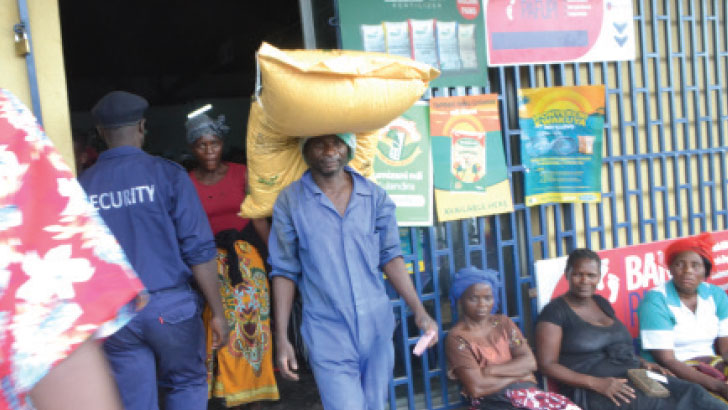AIP dumps lazy bones
The Affordable Inputs Programme’s (AIP) perennial chaotic performance has pushed Ministry of Agriculture to shift the focus from household to national food security, a move that has been hailed by some agricultural experts but criticised by governance commentators.
Minister of Agriculture Sam Kawale confirmed in an interview on Tuesday that government would now target smallholder farmers that have proven their productivity and willingness to transition from subsistence to semi-commercial agriculture.

The ministry will start providing inputs to smallholder farmers requiring the affordable inputs, meaning that subsidies will be allocated based on need and productivity rather than poverty.
This new approach is a policy departure from the initial goal of AIP as well as its predecessor the Farm Inputs Subsidy Programme (Fisp) which was to boost economic and social status of poor farming household through provision of the subsidies.
Former president Bingu wa Mutharika introduced the taxpayer-funded Fisp in 2005 which President Lazarus Chakwera renamed AIP in July 2020, barely two months after his Tonse Alliance took over government through a court-sanctioned presidential election.
Kawale said subsidies would now be allocated based on need and productivity, rather than assumptions of poverty as there are productive smallholder farmers that genuinely require the inputs.
“The programme’s goal is now national food security in addition to household food security. Those who won’t make the list will be in programmes such as cash transfer and public works,” he said.

The policy shift comes after Chakwera indicated in October last year that there was an urgent need for radical AIP reforms to improve efficiency and protect the programme from careless acts of negligence, corruption, incompetence and wastage.
“Though there may be pain and glitches in the transition from the current AIP, I believe we will all eventually be proud as a nation for leading the way in designing a programme that truly makes a difference, not just one that makes for popular politics,” said Chakwera on October 25 2022 when he addressed Malawians on the AIP status.
This was the day Chakwera fired his former Agriculture minister Lobin Lowe and his deputy Madalitso Kambauwa Wirima for what he termed as incompetence following revelations of the K750 million botched fertiliser deal with a United Kingdom-based butchery Barkaat Foods Limited.
But chairperson of the Parliamentary Committee on Agriculture Sameer Suleman in an interview doubted the practicability of the reforms saying the Tonse Alliance administration is good at talking “but action is zero”.
He said: “This is a government that is full of clueless individuals. They do not know what they want to do, especially at the Ministry of Agriculture where they are totally naïve.
“There has been a lot of talk about fertiliser and AIP in general by the President and his ministers but what is happening on the ground is totally different.”
Social protection specialist Chisangalalo Ntonio also expressed reservation with the policy departure arguing it would “definitely affect the poor and vulnerable households”.
“We will end up in a scenario where food will be available at national level but the ultra-poor households will not afford to buy it due to lack of purchasing power”.
He said: “What is more worrying is the fact that our social protection programmes such as Social Cash Transfer Programme as well as income public works programmes are characterised by several operational challenges… This leads to continued extreme poverty and vulnerability.”
Among the operational challenges, he cited inclusion and exclusion errors, inadequate funding, limited scope in terms of targeting and, in most cases, improper coordination.
“In this case, the poor will remain food insecure with no purchasing power leading to hunger and malfunction-related ailments,” said Ntonio who is also president of the Association of Social Workers in Malawi (Aswim).
He said if not reversed or backed by a proper strategy that targets the poor, the policy shift would contribute to widening the gap between the rich and the poor.
“The other spillover effects would include increased vulnerability which will result in high prevalence of malnutrition, high cases of theft and thievery as well as influx of street connected children in cities. As a country, we need to tread carefully on this policy shift despite the pressure to reform the AIP,” he said.
Centre for Social Accountability and Transparency Executive director Willy Kambwandira agreed with Suleman and Ntonio that the reforms are “a mockery to Malawians, and mere rhetoric”.
He said Malawians have not seen real and genuine commitments to implement the reforms, and “sadly, the development is leading to inefficiencies, poor service delivery and financial mismanaging”.
“People are deliberately creating chaos in order to benefit from the mess, as such we should forget about these so-called radical reforms. ”
But agricultural and development economist Henry Kankwamba hailed the policy departure, saying targeting productive farmers would protect every person and reduce poverty.
“Increased production has two effects. First, more production means an increase in the supply of agricultural commodities on the market. That means cheap food for all. This is how we can easily solve the hunger issue.
“Productive farmers still stand to benefit from economies of scale by selling in bulk through their farmer clubs. Farmers not organised may lose out from lack of scale economies but will benefit from the food security. In this case, even the worst affected are better off.
Second, all in all, re-aligning AIP to be productivity-oriented brings more benefits and is more pro-poor,” said Kankwamba, a lecturer at Lilongwe University of Agriculture and Natural Resources.
In the 2023/24 National Budget, AIP has been allocated K117 billion, which is K8 billion more than the previous year’s allocation where 2.5 million beneficiaries were targeted.
However, government has announced that this year’s number of targeted beneficiaries would be reduced to between 1.3 and 1.5 million.






One Comment